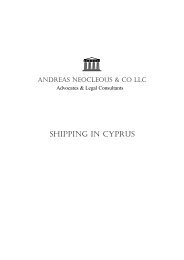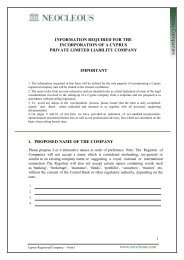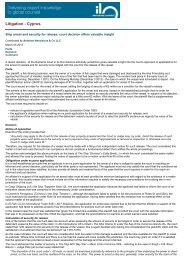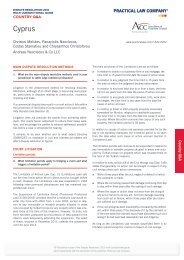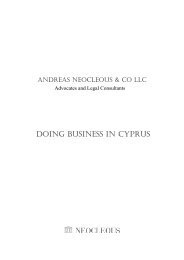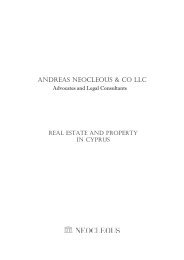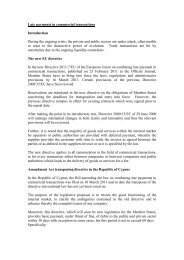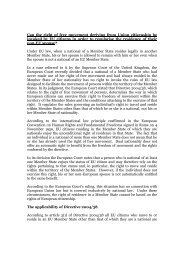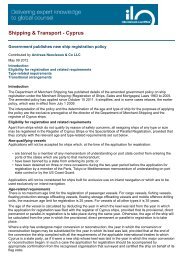Cyprus - Andreas Neocleous & Co
Cyprus - Andreas Neocleous & Co
Cyprus - Andreas Neocleous & Co
You also want an ePaper? Increase the reach of your titles
YUMPU automatically turns print PDFs into web optimized ePapers that Google loves.
CYP/22<br />
INTERNATIONAL AGENCY AND DISTRIBUTION LAW<br />
The principle deduced from the authorities is that the question of length of<br />
notice depends on the facts existing at the date notice is given. A weighty factor<br />
to be considered is the expense incurred in establishing and running an agency.<br />
In Kazinos & <strong>Co</strong> v Letraset (Export) Ltd, 31 the District <strong>Co</strong>urt of Nicosia held<br />
that:<br />
Primarily, the matter is governed by sections 165 and 166 of the <strong>Co</strong>ntract Law,<br />
Cap 149. Section 165 provides that the principal is bound to compensate the<br />
agent where there is an express or implied contract that the agency should be<br />
continued for any period of time and the agent's authority was previously<br />
revoked without sufficient cause. Section 166 provides that reasonable notice<br />
must be given of such revocation, otherwise the principal is liable to make good<br />
the damage suffered by the agent. It is to be noted that both provisions are<br />
modeled on sections 205 and 206 of the Indian <strong>Co</strong>ntract and Specific Relief<br />
Acts of 1872 respectively.<br />
In the present situation, where the contract made no provision for termination,<br />
it was conceded that the agreement was terminable upon reasonable notice. For<br />
a discussion of the principles involved in the termination of contracts of<br />
indefinite duration, see Staffordshire Area Health Authority v South<br />
Staffordshire Area Waterworks <strong>Co</strong>, 32 in which the authorities were reviewed. 33<br />
The court took into account the fact that the agents had spent more than CYP<br />
£30,000 (approximately €52,000) on advertising, employed six extra salesmen<br />
and moved into new premises to cope with the work, as well as the fact that at<br />
the time notice was given practically the whole of their business emanated from<br />
the agency agreement. In the circumstances, it went on to find that reasonable<br />
notice was nine months.<br />
In Panayides Ltd v Karatsi Ltd the court decided that for a five-year contract,<br />
the reasonable notice period was 10 months. In this case, the plaintiffs, who<br />
were producers of shoe polish and detergent, brought an action for a debt, and<br />
the defendants, who were the agents for distribution of these products,<br />
counterclaimed for breach of the agency agreement. The parties had had<br />
dealings since 1957 in their personal capacity, but in 1979 the defendants<br />
incorporated a limited company, as did the plaintiffs in 1983.<br />
The main issues were:<br />
• Whether an exclusive agency agreement existed between the parties;<br />
• Whether the plaintiffs had lawfully terminated the agreement; and<br />
• The amount of compensation to which the defendants were entitled if<br />
termination of the contract was found.<br />
31 Kazinos & <strong>Co</strong> v Letraset (Export) Ltd (1985), 2 JSC, p 443.<br />
32 Staffordshire Area Health Authority v South Staffordshire Area Waterworks <strong>Co</strong> (1978)<br />
3 All ER 769.<br />
33 For a fuller exposition of the law, see Halsbury's Laws of England (3d ed) vol 8, para<br />
267 at p 156.<br />
(Release 2 – 2013)




